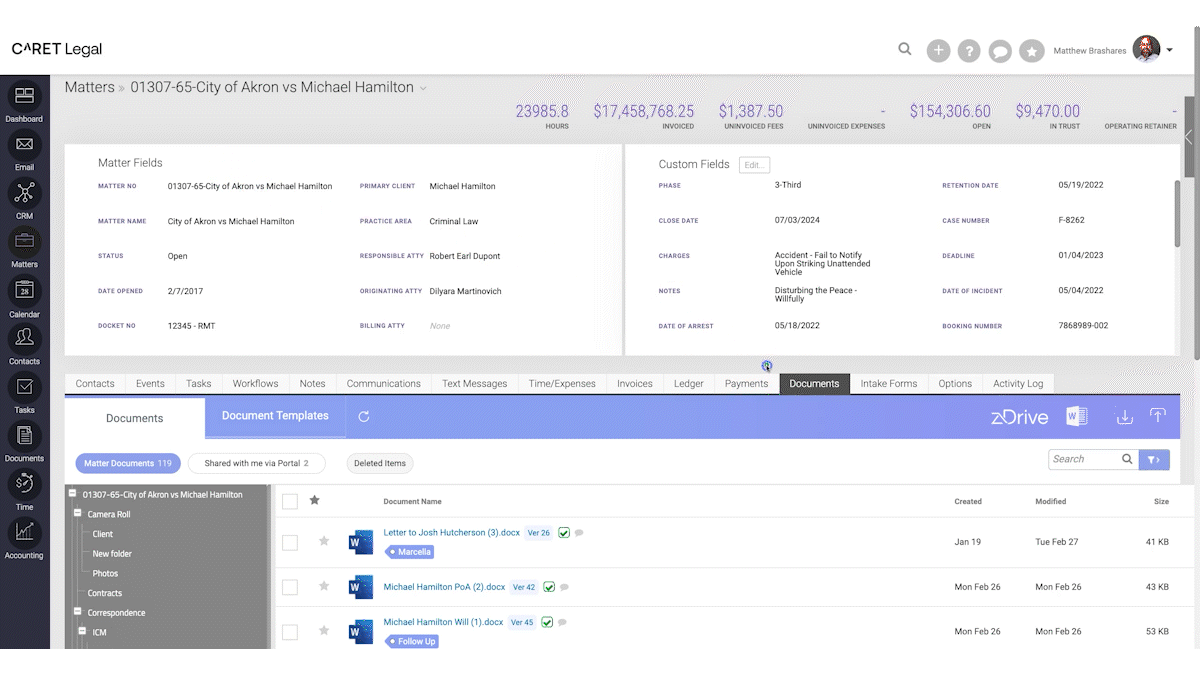The big takeaways:
- Inconsistent or vague privilege logs can lead to waived privilege, compliance issues, and discovery disputes.
- CARET Legal streamlines privilege logging with built-in tagging, document relationships, and audit-ready tools.
- Centralized, secure collaboration ensures litigation teams stay aligned, accurate, and protected throughout discovery.
Effective privilege log management helps law firms meet discovery obligations while reducing the risk of waived privilege or disclosure. Courts expect detailed documentation when a legal team withholds materials under attorney-client privilege or work product protection. Without a reliable logging process, firms may face challenges that compromise confidentiality or delay litigation strategy.
By following consistent procedures and using legal practice management software built for document control and collaboration, law firms can better organize privilege logs, maintain defensible records, and support client protection throughout the litigation process.
What a Privilege Log Is and Why Accuracy Matters
A privilege log lists the documents withheld during discovery due to legal privilege. Most commonly, these include confidential communications between attorneys and clients or materials prepared in anticipation of litigation. Logs typically record the document’s type, date, author, recipient(s), and the legal basis for withholding it.
Courts often require a level of specificity that many generic logging practices fail to meet. Overly broad or unclear entries can trigger discovery disputes, invite scrutiny, or even lead to privilege waiver. A consistent and detailed approach not only supports law firm compliance but also helps litigation teams maintain a clear audit trail.
Build a Structured Workflow for Privilege Logging
A structured process provides the foundation for accurate, defensible privilege logs. Litigation teams should agree on a logging workflow early in case preparation, aligning roles and expectations across attorneys, support staff, and technology tools.
Recommended practices include:
- Logging attorney-client communications during the first round of document review
- Labeling each document with the correct privilege type (e.g., attorney-client, work product)
- Assigning consistent metadata, including author, recipients, date, and document category
- Writing descriptions that explain the basis for withholding without revealing protected content
Following a set format helps teams stay organized, avoid duplicate entries, and respond quickly to challenges during discovery.

Streamline Privilege Logs with Legal Technology
Manual processes make privilege logging vulnerable to errors, especially during high-volume discovery. Legal teams benefit from compliance case management software that supports tagging, foldering, and audit-ready documentation.
With CARET Legal’s integrated tools, firms can:
- Tag documents as privileged during initial review workflows
- Search and filter for specific documents based on your tags
- Organize entries by categorizing them into folders
- View related communications and attachments together for the complete context
Between CARET Legal’s native document management functionality and matter-centric activity log, these features help legal professionals reduce administrative work while maintaining accurate, consistent logs across all matters.
Keep the Litigation Team Aligned and Secure
Privilege log management requires collaboration among attorneys, paralegals, and litigation support staff. To protect sensitive material, this collaboration must occur in a secure environment that supports access controls and transparency.
With CARET Legal, teams can coordinate within a centralized workspace where permissions are role-based, comments stay attached to files, and version tracking helps monitor changes. Everyone involved in the logging process works from the same up-to-date source with no spreadsheets, no disconnected folders, and no guesswork.
Common Mistakes That Undermine Privilege Logs
Even small errors in privilege logging can lead to major problems. To avoid challenges or sanctions, law firms should stay alert to common pitfalls such as:
- Using vague descriptions that fail to justify privilege claims
- Forgetting to update logs when document classifications change
- Failing to group related emails and attachments
- Reusing generic language instead of drafting case-specific entries
Regular reviews of the privilege log, paired with clearly defined standards, help legal teams maintain compliance and minimize the chance of disputes.
Strong Privilege Log Management Reduces Exposure
Privilege logs support a firm’s compliance strategy and help manage litigation risk by documenting withheld materials with precision and consistency. A well-managed log protects sensitive information, reinforces a firm’s position in discovery, and reflects a disciplined approach to litigation.
By adopting consistent procedures and using legal practice management tools like CARET Legal, law firms can reduce manual errors, track privileged content efficiently, and meet their obligations with greater confidence. Built-in tagging, document relationships, and audit controls support better outcomes and stronger discovery compliance across the board.
Start a free trial of CARET Legal to simplify privilege log management and strengthen your firm’s approach to discovery compliance.
